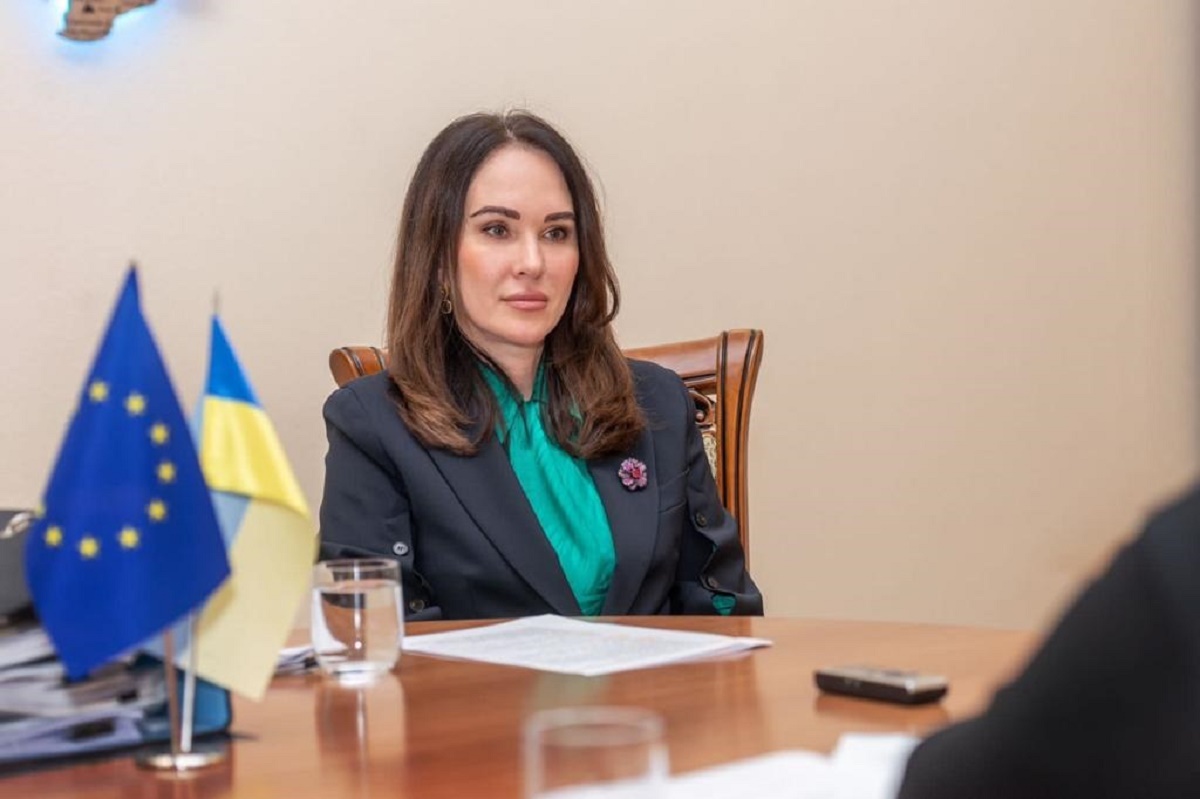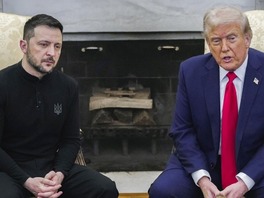Ukraine and its international partners have developed a special legal mechanism that will allow to collect compensation from Russia for the damage caused by it as a result of military aggression against our country. To date, the Register of Damages has already been created, which is ready to accept applications from all those affected by the actions of the Russian Federation. Deputy Head of the Office of the President Iryna Mudra, who held the position of Deputy Minister of Justice of Ukraine until March 29, 2024, told "Apostrophe" about how to submit such statements, how the damages will be assessed, and where the funds for compensation will come from.
All roads lead to The Hague
- Why was it necessary to create special international bodies to pay reparations?
- When the international legal community began to study the issue of compensation for the losses of Ukraine and victims of Russian aggression, it found that at the moment there is no such judicial authority that could issue a decision on such payments. Of course, they could be adopted by Ukrainian courts. However, such decisions in Ukraine could be implemented only at the expense of sovereign assets of Russia in Ukraine. But such assets have already been confiscated by the state. In other jurisdictions, the execution of Ukrainian court decisions at the expense of assets of the Russian Federation is extremely complicated.
As a result, Ukraine and its partners concluded that the creation of a special international mechanism is necessary. The working group developed the concept of such a mechanism and presented it for consideration by the UN General Assembly in November 2022. The resolution, adopted, comprises three key provisions: recognition of the Russian Federation's act of aggression and its responsibility, including reparations payment; establishment of a new legal mechanism for reparations collection; recommendation for the creation of an international register of damages caused by Russia.
Following the resolution's adoption, the Ministry of Justice, in collaboration with its partners, initiated the creation of the Register. The Council of Europe offered its help, and at the Reykjavík summit in May 2023, the establishment of an International Damage Register was announced. Later, the Netherlands offered to host it as an international institution in The Hague.
- Why was The Hague chosen as the location of the Register?
- This city is regarded as the capital of global justice. The International Criminal Court, the International Court of the United Nations and other judicial bodies are located there, which in the future will consider cases about crimes committed by Russia. Therefore, it was quite logical to place the Register of Damages at this place.
- When will the Register start collecting information?
- On April 2, at the ministerial conference ‘Restoring justice for Ukraine,’ the technical commencement of accepting applications by the Register was announced.
- Where should applications be submitted?
- Applications will be accepted through the "Diia" portal, because the International Register of Losses is a digital platform.
Each person will be able to record their losses from the war with the help of a smartphone or computer.
- But not all citizens are so well versed in modern information technologies. Not everyone has a smartphone.
- If a person for some reason does not have the opportunity to use "Diia", then he will be able to get help from authorized institutions - Centers for the provision of administrative services (CNS), from notaries, free legal aid centers, from state registrars, from local administrations, etc. But on this occasion, informational and explanatory outreach will be conducted for the public.
Citizens will be able to find detailed explanations on the procedure for filing applications on the websites of the Ministry of Justice and the International Register of Damages.
- Who can apply to the Register?
- It was determined that individuals, legal entities and the state of Ukraine can be the subjects of applications for compensation.
- What types of losses will be recorded in the Register?
The Board of the Registry has already approved categories of losses, totaling precisely 44. Notably, the largest list is for individuals. In particular, the list includes the following types of damages:
- material damage caused to movable and immovable property;
- loss of access to education and medicine;
- losses from forced resettlement, both within Ukraine and abroad;
- deportation from the occupied territories;
- loss of a loved one;
- damage caused to the life and health of a person, his personal integrity (bodily injuries, torture, sexual violence, etc.);
- forced deprivation of liberty;
- forced labor.
Businesses can seek compensation for damages such as the destruction of production facilities and equipment, as well as lost profits due to work stoppage, etc.
Damages caused to the state include destruction of infrastructure facilities, destruction or theft of cultural and historical values, damage to the environment, etc. State expenses for war-related humanitarian projects will also be submitted for compensation.
This is far from a complete list. Interested parties can find a comprehensive list of all categories of damages on the websites of the Ministry of Justice and the International Registry of Damages.
- It is obvious that the fact and amount of damages will have to be confirmed somehow. What documents will need to be attached to the application?
- For each category of damage, a special application form will be developed, which the person will fill out, choosing answers from the list. There will also be a section in the application where you can upload documents confirming ownership of the damaged property, as well as materials confirming its damage or destruction.
- What materials can these be?
- Any that the applicant possesses: photo or video recording, media publications, expert evaluations, inspection reports, etc. Actually, any available information that confirms the fact of destruction.
Photo: Office of the President of Ukraine
Who will assess the damages
- Do applicants need to provide documents regarding the value of destroyed or damaged property?
- Such documents will also be accepted as evidence. For instance, if an individual has independently repaired a damaged item, documents validating the repair expenses can be included with the application. Similarly, if the individual possesses a document verifying the assessment of damages, such as a decision from a Ukrainian court, it can also be appended to the application.
If there are no such documents, then there is nothing wrong: at the stage of collecting applications, documents regarding the assessment of damages are not mandatory. The function of the Register is only to record losses. Another body will make specific assessments and assign compensations.
- Which one?
- The Compensation Commission. It represents the second component of the international compensation mechanism. Efforts are currently underway to establish this commission, which will be responsible for reviewing all submitted documents related to damage assessment. However, it is crucial to note that the assessments provided in the documents submitted by individuals will not be considered. The commission will independently determine the compensation amounts.
The Commission will also assess non-material damages, including damage to life and health. Therefore, if a person has any documents that confirm, for example, the costs of treatment, then it is worth attaching them to the application.
However, if the person does not have any documents indicating the amount of damages, the Commission will still make a decision on compensation, based on its own assessment and approved methods.
- Is there provision for compensation for the death of people?
- Yes.
- Who will get it?
- Relatives of the first degree - parents, spouses, children.
- Does the compensation mechanism apply only to civilians? Do military personnel injured at the front also fall under it?
- There is no exception for the military in the approved damage categories. Therefore, in the event that they have suffered material or non-material damages, they can also submit applications to the Register and claim compensation. However, there are certain difficulties in the interpretation of such losses, since combatants have a different status in international law. These difficulties will have to be resolved, but in principle the right to compensation for the military is not limited.
- Not only Ukrainians suffer from the war. Quite a lot of foreigners - journalists, volunteers, etc. - were injured and died as a result of the actions of the occupiers. They will be able to apply for compensation?
- The compensation mechanism was created not only for Ukrainians, but for all people affected by Russian aggression. So citizens of any state can submit applications to the Register.
And not only those who were physically injured. It can be, for example, a foreign student who was forced to leave Ukraine without completing his studies. Or a person who worked here and
lost her job because of the war. They are all entitled to compensation.
- Now millions of our compatriots are abroad. Will they be able to submit applications to the Register?
- Of course, these people can claim compensation for losses related to forced displacement abroad due to war, as well as forced displacement from their place of residence, loss of property, etc. Yes, like all citizens of Ukraine.
- However, there are no Ukrainian Centers of Administrative Services abroad...
- Yes. And they will not be able to travel to other countries to receive applications. So we hope that Ukrainians who have gone abroad and affected foreigners will figure out how to use "Diia" and will be able to apply online. For this, step-by-step instructions will be created.
- Many people lost their property in the occupied territories. However, how to prove these losses? After all, neither the Ukrainian authorities nor the International Register currently have access to their property.
- This is a really problematic issue. However, as for real estate, it can be solved in principle.
Real estate properties are documented in the state register. If satellite imagery indicates the absence of a house, it serves as adequate evidence of material damage.Also, there will be no big problems with cars, since they are also in the state register.
That is, when it comes to property that was in public registers, the fact of its loss can be recorded. It will be more difficult to assess the amount of losses, since there is no access to these objects yet.
A more challenging aspect concerns movable property. It can be difficult to establish its type and value. This issue persists in unregistered territories as well. Proving the loss of property not documented in registers is more complex. However, this doesn't diminish the importance of declaring such losses.
Where to get money
- The most difficult, but also the most important question: where will the money come from to pay compensations?
- Without financial filling, the Register will remain only a list of losses and victims. Therefore, of course, it is necessary to look for sources of financing. It is best if this source becomes the good will of the Russian Federation to compensate for the damage caused by it. Then the fund may receive part of the profit from its foreign trade operations. This was the case, for example, in the case of Iraq and Kuwait, when Iraq transferred 30% of profits from oil sales to compensation for its aggression.
- To be honest, the probability of such goodwill appears to be very low so far.
- That is why at the moment we and our foreign partners see Russian state assets frozen in various countries as the most real resource. The discussion is ongoing possibilities of confiscation of these assets. The application of such a legal doctrine is proposed as a countermeasure.
Under this doctrine, all nations impacted by Russian aggression, which includes not only Ukraine but also states providing support to Ukrainian refugees and offering financial and military aid, possess the right, and indeed the obligation, to undertake measures to seek compensation for the damage resulting from the internationally unlawful actions of the aggressor nation.
This gives them the right to apply a countermeasure - the removal of sovereign immunity from Russian state assets and their transfer to the victim of aggression.
- However, so far, despite the heated discussions, this issue has not been resolved. What stands in the way?
- This question is divided into two, since there are different types of funds that are proposed to be withdrawn. There is money that generates frozen assets - profit from them. And regarding their actual use there are no legal obstacles - we only need the political will of our partners. We hope that in the near future such a will will appear, and it will be possible to use these funds for assistance for Ukraine.
As for the assets themselves, legal discussions are still ongoing. There are experts who believe that there are reasons to confiscate these assets as part of countermeasures. However, there are those who are convinced, maybe not without Russian help, that this cannot be done.
In addition, Europeans are concerned not only with legal aspects. Many experts wonder how the confiscation of sovereign assets will affect the EU financial system, whether it will undermine investor confidence and cause economic losses.
We, in turn, convince our partners that there will be much greater losses if Russia defeats Ukraine and moves on to Europe.
- However, it is possible that the Europeans believe that there is still enough time to make decisions. After all, the compensation mechanism is just starting to work. It will take time to accumulate and process information in the Register. Then the Compensation Commission will start work, and it will have to solve difficult tasks... Most likely, it will be years before the first decisions on compensations. Therefore, European governments are in no hurry to confiscate.
- If it suddenly happens that the decision on the confiscation of assets will be made earlier than the appointment of compensation, this will not prevent the use of these funds. They can be allocated, for example, as advance payments for critical infrastructure rehabilitation projects, and then, when compensation is awarded, they can be reduced by the amounts already allocated.
- Even now, estimates of the damage caused to Ukraine significantly exceed the amount of seized assets. And there is still no end in sight to the losses. So even if all Russian funds are confiscated, they will not be enough for all compensations.
- Most likely, it will not be enough even for half. According to international experts, the state's losses from Russian aggression have already exceeded 486 billion dollars. If you add to this the losses of citizens and businesses, the amount will be at least twice as large. Therefore, when the process of formation of the compensation mechanism is completed, additional funds will have to be sought.
- Which ones, for example?
- We do not rule out that one of the real ways could be taxation of the main items of Russian exports - energy carriers, gold, diamonds, etc. Importing countries can introduce an additional tax that will be sent to the Compensation Fund. Our task is to convince other countries that such a step is real and expedient.






